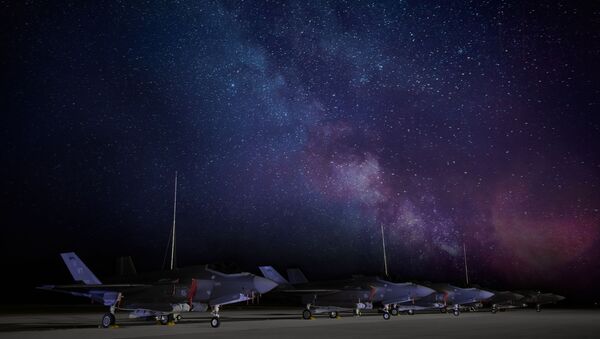Ten F-35A Lightning II jets and more than 150 airmen from the Vermont Air National Guard have been deployed to the Tyndall Air Force Base in northwestern Florida for weapons reliability testing.
In a statement on its website, the Guard’s 158th Fighter Wing indicated that the two-week training would help the unit achieve combat readiness for its F-35s.
158th Fighter Wing Plans Officer Lt. Col. Brian Sherry said the unit was “excited for the opportunity to take the Vermont Air National Guard on the road,” noting that the manoeuvres were “part of the evolution to achieve F-35 combat readiness status,” with tests occurring “across a wide spectrum of tactics in preparation for real world deployments.”
The drills will include "weapon system performance" testing, the identification of deficiencies, and recommendations for corrective action.
The 158th Fighter Wing is ordinarily based at the Burlington National Guard Base in Burlington, Vermont. When activated, it falls under Air Force Combat Command. Along with two fighter squadrons, the wing includes maintenance, mission support, and medical groups. Aircraft from the wing have been deployed to the Middle East – including for the mission to enforce the Washington-imposed no-fly zone below the 32nd parallel north in Iraq in the 1990s – and to Iraq itself after the 2003 US invasion. Aircraft from the unit have also patrolled the skies in Pakistan, Bosnia, Kuwait, Qatar, and Cyprus.
The wing received its first conventional takeoff and landing F-35As in 2019.
Earlier this week, the Pentagon’s weapons testing watchdog revealed that the F-35 still has nearly 900 hardware and software problems of varying urgency, including cybersecurity and issues with lengthy repairs. The $1.6 trillion platform has yet to be certified as fully combat-ready, with simulations testing the planes’ performance against comparable Russian or Chinese aircraft yet to be carried out and repeatedly pushed back.
Along with the US Air Force, Navy, and Marine Corps, the F-35 has been delivered to Australia, Israel, Italy, Japan, the Netherlands, Norway, South Korea, and the United Kingdom, with planes for Belgium, Denmark, Poland, Singapore, and the United Arab Emirates on order. Turkey, which took part in the fifth gen fighter’s development, was booted out of the programme after moving ahead with the purchase of an advanced Russian-made air defence system.

